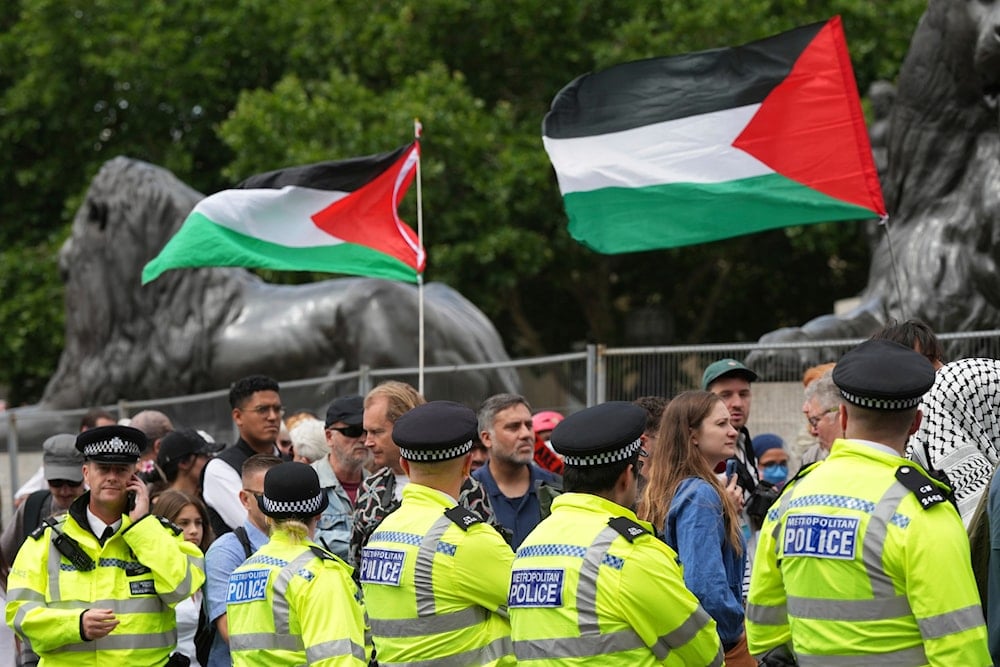Arrests of elderly activists fuel anger over UK Gaza protest laws
Over 200 arrests were made in Britain under UK terrorism laws after the Palestine Action ban sparked civil liberties outcry and a mounting legal challenge.
-

Demonstrators pass a line of police during a protest by Palestine Action group in London, Monday, June 23, 2025 (AP)
Deborah Hinton was held last month in a police cell for seven hours, during which she was fingerprinted and had her DNA swabbed from her mouth, marking her first-ever arrest, an experience that left her deeply shaken and in a state of trauma, as she now faces the possibility of a six-month jail sentence under UK terrorism laws, according to The Guardian. A former British magistrate honored by Queen Elizabeth, she is an unlikely suspect for terrorism.
Hinton is one of over 200 individuals in Britain recently arrested for participating in peaceful demonstrations against the war on Gaza and protesting the UK government's decision to classify the activist group Palestine Action as a "terrorist organization", with critics arguing that this ban represents an extreme suppression of free speech.
Among those detained by police in recent months are Jon Farley, a retired school principal who was silently holding a satirical magazine cartoon; Marianne Sorrell, an 80-year-old former teacher who was held for nearly 27 hours while officers searched her home; and the Rev Sue Parfitt, an 83-year-old retired priest arrested as she sat in a camping chair outside the British parliament in London, displaying a sign expressing support for Palestine Action.
The British Parliament recently designated Palestine Action as a "terrorist organization" following a series of protests, the most recent of which was when members of the group caused $9.5 million in damages at a UK military base. According to Yvette Cooper, the senior government minister overseeing national security, Palestine Action's activities have endangered the country's security through property damage severe enough to qualify as terrorism under UK law.
Supporters defy the ban
However, there has been resistance to the decision, which will be displayed on Saturday, when at least 500 people are expected to join a “lift the ban” protest in Westminster, at which they will silently hold placards proclaiming, “I oppose genocide, I support Palestine Action.”
Public opinion in Britain, like elsewhere, has shifted dramatically in recent months regarding the war in Gaza, as people react to disturbing images of starving Palestinian children, and to reports of adults and children being shot or killed while desperately searching for food and water for their families.
According to The Guardian, Tim Crosland, a former UK government lawyer turned activist and co-founder of Defend Our Juries, the group organizing Saturday's protest, questioned how authorities had reached this situation regarding the suppression of peaceful dissent. At a Wednesday press conference, he declared the demonstration would put "Britain's backbone on display," framing it as a pivotal moment for civil liberties.
Cooper emphasized this week that the ban was implemented following rigorous security assessments, citing concerning intelligence about planned future operations that cannot currently be disclosed due to active court cases. She also noted that the ban exclusively encompasses Palestine Action and does not affect protesting for Palestine.
Condemnations pour in
The ban on Palestine Action has sparked significant controversy, drawing criticism from multiple quarters, including Volker Türk, the UN's human rights chief, who argued the designation violates international human rights law.
Amnesty International has also condemned the move, while over 300 prominent British Jewish figures called it "illegitimate and unethical" in a joint statement.
Additionally, dozens of international scholars, including Naomi Klein and Angela Davis, have voiced support for what they describe as a "growing campaign of collective defiance" against the government's decision.
Hopes to overturn the ban
The group has initiated legal proceedings to contest the prohibition, securing a November court date where their defense will be led by Gareth Pierce, the celebrated human rights attorney known for her decades of victories against UK authorities.
Legal representatives supporting Palestine Action have advised that a successful overturning of the ban could pave the way for wrongful arrest lawsuits from detained protesters, as the 200-plus individuals already arrested may soon be joined by hundreds more demonstrators expected at this weekend's protest.
Protest organizers face allegations of deliberately attempting to overload police and court resources, with a Metropolitan Police spokesperson stating they have information indicating demonstrators are being urged to attend in large numbers, specifically to pressure law enforcement and judicial systems.
Palestine Action's supporters have rejected the allegations while conceding that detaining over 500 protesters would prove logistically difficult, noting London's approximate capacity of 520 police cells at any given time.
Among the planned participants is Alice Clack, an NHS senior obstetrician-gynaecologist and Doctors Without Borders volunteer, who also engages in climate activism and was previously arrested last July while displaying a pro-Palestine Action sign near Parliament, which could now lead to her prosecution under counterterrorism legislation.
She told The Guardian her grandfather's experience as a Kindertransport refugee from Nazi Europe taught her to confront injustice, while calling the terrorist designation of Palestine Action a "gross abuse of state power."
According to official figures released by counter-terrorism units, police have made 221 arrests in the last five weeks, though only 10 of those detained, including numerous senior citizens, have been formally charged with offenses.

 5 Min Read
5 Min Read








